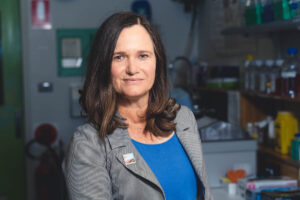Getty Images
New therapies that reprogram the immune system could serve as early intervention for children at high risk of developing type 1 diabetes (T1D), one of the most serious and common chronic diseases of childhood.
Dr Claire Jessup from the Flinders Health and Medical Research Institute (FHMRI) in the School of Medicine and Public Health at Flinders University has been awarded a two-year Tim Welborn Early-Mid-Career Research Fellowship from the Juvenile Diabetes Research Foundation (JDRF) Australia to investigate innovative approaches to suppress the autoimmune response to type 1 diabetes and prevent its progression.

Dr Jessup says he hopes the approach could one day be used in treatments to reprogram the immune response in young people before they develop type 1 diabetes. He will be based at Flinders University’s new Health and Medical Research Building, which officially opened last week.
An autoimmune disease, T1D develops when the body’s immune system attacks and destroys beta cells in the pancreas, causing glucose to build up in the blood and insulin production to stop.
Approximately 130,000 Australians have type 1 diabetes, which, despite receiving the highest standards of care, has significant lifelong consequences and is estimated to cost the economy $2.9 billion per year.
“Although testing for type 1 diabetes in at-risk children is improving, creating opportunities to treat the disease earlier, there are currently no preventative treatments,” Dr. Jessup says.
“Type 1 diabetes typically requires lifelong insulin therapy and continuous glucose monitoring, which can be costly, so delaying the use of these treatments and devices could be highly beneficial.
“We hope to develop a treatment that reduces inflammation in the pancreas and prevents or delays the onset of diabetes. If successful, our approach could eliminate or reduce patients’ lifelong insulin needs.”
“Importantly, this has the potential to halt the accumulation of long-term complications that threaten people with type 1 diabetes, reduce hospitalizations and ease the obstacles associated with managing this lifelong, life-altering disease,” she says.
Dr. Jessup was awarded $134,232 for the fellowship, titled “Fine-tuning immune checkpoints to prevent type 1 diabetes,” from JDRF, one of the leading non-governmental funding agencies for T1D research globally.*
The project will test approaches to enhance the immune system’s natural regulatory signals, called “immune checkpoints,” to prevent autoimmune destruction of insulin-producing beta cells.
“T1D is primarily caused by T cells, a key component of the immune system that are important in defending against infection and cancer but can also mistakenly attack healthy cells,” said Dr. Jessup.
“Autoreactive T cells are responsible for damaging insulin-producing pancreatic beta cells during the development of type 1 diabetes.
“By the time type 1 diabetes is diagnosed, most of the beta cells in the pancreas have been destroyed.
“For the first time, we target newly activated autoreactive T cells and use the cells’ own regulatory mechanisms to prevent them from killing insulin-producing beta cells in the pancreas,” she added.
This project expands on the recently published “Antibody agonists induce immune receptor signaling via localized elimination of receptor protein tyrosine phosphatases” and aims to fine-tune immune checkpoint signaling to reduce T cell activity.
*This grant was provided through the JDRF Australia Type 1 Diabetes Clinical Research Network (grant number 2-SRA-2024-1576-MN), a recipient of an Accelerated Research Grant from the Commonwealth of Australia’s Medical Research Future Fund.
/Public Release. This material from the originating organization/author may be out of date and has been edited for clarity, style and length. Mirage.News does not take any organizational stance or position and all views, positions and conclusions expressed here are solely those of the authors. Read the full article here.


